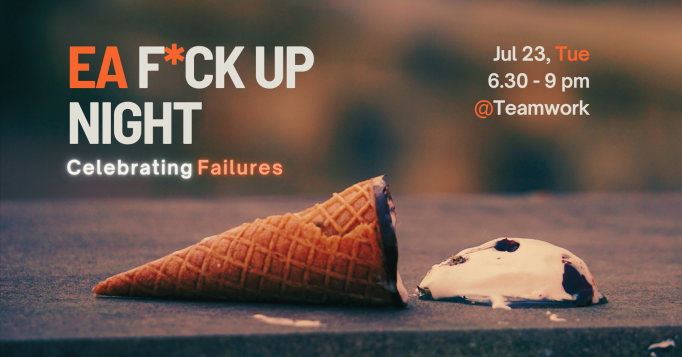You go to an EA event. Everyone else seems to have two science degrees, runs a charity, has a healthy hobby and regularly calls their mum. Meanwhile, you're proud that you found one clean t-shirt to wear that day. 🙃 Imposter syndrome activates. Sounds familiar?
Publicly, we often share our successes, but rarely the mistakes that happened along the way. This can create a warped picture of reality, where everything goes smoothly.
How can we counter it? By spreading a meme that failures are a normal part of life.
What is a Fuck Up Night?
A Fuck Up Night is a type of event where people openly share their stories of failure. To be clear, it's not about humble brags, but projects that didn't work out, mistakes that really felt painful, times where you put in a lot of effort and the results were far from what you aimed for.
We have three confirmed speakers who already bravely committed to share their stories of failure:
- Sara Recktenwald, co-founder of Impact Ops, formerly at EV UK/CEA
- Nadia Montazeri, a biosecurity researcher, formerly at the European Commission
- Marta Krzeminska, your host, an ex Head of Marketing at Mind Ease
After hearing their stories, we'll open the floor to hear from... you! Then we'll progress to informal chatting.
What you can expect from the evening:



Join the event to help create a more balanced picture of the EA community, connect with others, and spread the meme: failures are ok!
Schedule of the evening
- 6.30 pm. Arrivals. Doors open, come to socialise!
- 7 pm. Event start: sharing and celebrating failures.
- 8.30 pm. Open socialising & snacks.
Please try to arrive on time to not disturb the speakers in the middle of their story-sharing.
FAQ
- I'm not sure my story is worthy of sharing, it won't teach anyone anything.
The goal of sharing is not to impress anyone with the magnitude of your failure or for the failure to be a lesson. If it felt like a failure to you, it's a valuable story for the crowd to hear.
- I'd love to share my story, where do I sign up?
That's great to hear! Feel free to comment on this post, this will give me a better idea of the expected numbers of sharers. 💡 And... consider bringing a prop that could symbolise the failure you'd be speaking about. E.g. a mug you were holding when you got rejected at the last application stage for an Important Job at an Impactful Organisation.
I'm not sure if I want to share anything, can I just come without any commitments?
Of course! You're free to join without promising to sharing anything. And, if you change your mind during the event, the non-judgemental floor will be open for you.


To everyone who joined the first FUN (F*uck Up Night) Session 💕 Thank you for open sharing, active listening, and co-creating a welcoming atmosphere!
I have two things for you 👉 one ask and one gift.
🙋♀️ Ask. Did you enjoy the session? Did you think it was a disaster? This anonymous feedback form is your chance to let me know! It takes just 2 min and will really help me improve future events of similar kind!
🎁 A gift of bonus links. Some resources that my attention has selectively caught before the event:
Cool that you're doing this! I could share two failures, one in my career plans and one in job applications. I could do that in 1-4min, depending on how many other people want to share and how much time we have. Looking forward! :)